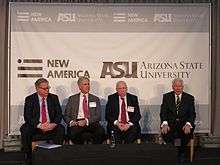Michael Lind
| Michael Lind | |
|---|---|
 Left to right: Michael Lind, Ian Morris, Lawrence Freedman, Philip Bobbitt; "What Do Lessons from History Tell Us About the Future of War?" panel discussion at New America Foundation first annual Future of War conference, Washington, D.C., 25 February 2015 | |
| Born |
April 23, 1962 Austin, Texas, United States |
| Nationality | American |
| Education | M.A., J.D. |
| Alma mater | University of Texas at Austin, Yale University, University of Texas Law School |
| Occupation | Journalist, historian, author |
Michael Lind (born April 23, 1962) is an American writer. Lind is an ASU Future of War Fellow at New America in Washington, D.C., which he co-founded, a contributing editor of Politico and The National Interest and a columnist for Salon. Lind was a guest lecturer at Harvard Law School[1] and has taught at Johns Hopkins and Virginia Tech. He has also been an editor or staff writer at The New Yorker, Harper's Magazine, and The New Republic. Lind has published a number of books on U.S. history, political economy, foreign policy, and politics as well as fiction, poetry and children’s literature.
Life
Lind was born in Austin, Texas, a fifth-generation native of the state. He graduated from the University of Texas at Austin with honors in English and History (Plan II). In 1985 he received a Master of Arts degree in International Relations from Yale University and, in 1988, a Juris Doctor degree from the University of Texas Law School. Lind moved to Washington, where after working as Assistant to the Director of the U.S. State Department’s Center for the Study of Foreign Affairs in 1990–91 he became Executive Editor of The National Interest from 1991–94. From 1994–98 he lived in Manhattan and worked for Harper’s Magazine, The New Republic and The New Yorker. In 1998 he became Washington Editor of Harper’s Magazine and moved to Washington, where in the same year he, Sherle Schwenninger and Walter Russell Mead co-founded the New America Foundation with Ted Halstead, with whom Lind co-authored The Radical Center: The Future of American Politics.[2]
Work
Lind has examined and defended the tradition of American democratic nationalism associated with Alexander Hamilton in a series of books, including The Next American Nation (1995), Hamilton’s Republic (1997), What Lincoln Believed (2004) and Land of Promise: An Economic History of the United States (2012). Lind has also written two books on U.S. foreign policy, The American Way of Strategy (2006) and Vietnam: The Necessary War (1999). A former neoconservative in the tradition of New Deal liberalism, Lind criticized the American Right in Up From Conservatism: Why the Right is Wrong for America (1996) and Made in Texas: George W. Bush and the Southern Takeover of American Politics (2004). Lind has also published a novel, Powertown (1996), a narrative poem, The Alamo (1997), and a children’s book, Bluebonnet Girl (2004).
In May 2015, Lind argued for the adoption of "enlightened nationalism", also called "liberal nationalism" in which the United States "would combine its security strategy of offshore balancing with intelligent economic nationalism." Regarding NATO and other U.S. allies, a liberal nationalist foreign policy, Lind continued, "would shift much of the burden of the defense of its allies and protectorates to those countries themselves." Lind argued for "an immigration policy in the national interest would shift the emphasis from family reunification to skills . . . [and] enable long-term population growth . . . compatible with the economic integration and cultural assimilation of newcomers to the United States."[3]
Bibliography
Books
- The Next American Nation: The New Nationalism and the Fourth American Revolution, Free Press, 1995
- Up From Conservatism: Why the Right is Wrong for America, Free Press, 1996
- Powertown, HarperCollins, 1996
- The Alamo: An Epic, Houghton Mifflin, 1997
- Hamilton's Republic: Readings in the American Democratic Nationalist Tradition, Free Press, 1997 (editor)
- Vietnam: The Necessary War: A Reinterpretation of America's Most Disastrous Military Conflict, Free Press, 1999
- The Radical Center: The Future of American Politics, Doubleday, 2001 (co-authored with Ted Halstead)
- When You Are Someone Else, Aralia Press, 2002
- Made in Texas: George W. Bush and the Southern Takeover of American Politics, Basic Books, 2002
- Bluebonnet Girl, Henry Holt, 2004
- What Lincoln Believed: The Values and Convictions of America’s Greatest President, Doubleday, 2005
- The American Way of Strategy: U.S. Foreign Policy and The American Way of Life, Oxford University Press, 2006
- Parallel Lives Etruscan Press, 2007
- Land of Promise: An Economic History of the United States, HarperCollins, 2012
Articles
- The Free Trade Fallacy, Prospect Magazine, January 2002[4]
- The Case for American Nationalism, The National Interest, May 2015[5]
- When Nationalism Strikes Back, The National Interest, October 2016[6]
References
- ↑ "Michael Lind — Biography". Mourningamerica.com. 1935-12-06. Archived from the original on July 14, 2011. Retrieved 2010-10-22.
- ↑ The Radical Center: The Future of American Politics (2001)
- ↑ The Case for American Nationalism | The National Interest
- ↑ Free trade fallacy | Prospect Magazine
- ↑ The Case for American Nationalism | The National Interest
- ↑ When Nationalism Strikes Back | The National Interest
External links
- Michael Lind Biography
- TNR article: For a New Nationalism, by Lind and John Judis (article 10 of 27)
- Video interviews/discussions involving Michael Lind on Bloggingheads.tv
- New America Economic Growth Program
- Value Added Blog
- Michael Lind page at The Breakthrough Institute
- Michael Lind page at The Smart Set
- Appearances on C-SPAN